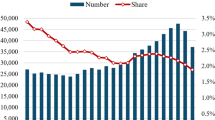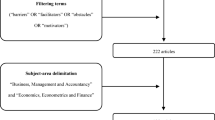Abstract
The existing international literature on higher education centers on the transition from elite to mass higher education, the changing relationship between governments and universities, and the differentiation of the institutional fabric of national systems. These important institutionalized concerns lead to an unbalanced research agenda if other basic features are not pursued. Two additional fundamental features need expanded attention: substantive academic growth, with its roots in the research imperative and the dynamics of disciplines; and innovative university organization, a sharply growing concern among practitioners as universities seek greater capacity to change.
Proliferating at a rapid rate, modern academic knowledge changes fields of study from within, alters universities from the bottom-up, and increases the benefits and costs of decisions on the inclusion and exclusion of various specialties. The long-term trend from simple to complex knowledge, arguably more important than the trend from elite to mass higher education, forces universities to position themselves between knowledge expansion and student expansion, with emphasis increasingly placed on the knowledge dimension. Innovative universities explore new ways of organizing knowledge and of more effectively exploiting the fields in which they are already engaged. Greater awareness of new means of knowledge organization will help universities make wiser choices in the twenty-first century.
Similar content being viewed by others
References
Ben-David, J. (1977). Centers of Learning: Britain, France, Germany, United States, New York: McGraw-Hill.
Becher, T. (1989). Academic Tribes and Territories: Intellectual Enquiry and the Cultures of Disciplines, Milton Keynes, Great Britain: The Society for Research into Higher Education and Open University Press.
Becher, T., Henkel, M. and Kogan, M. (1994). Graduate Education in Britain, London: Jessica Kingsley.
Clark, B.R. (1983). The Higher Education System: Academic Organization in Cross-National Perspective, Berkeley and Los Angeles: University of California Press.
Clark, B.R. (1987). The Academic Life: Small Worlds, Different Worlds. Princeton: The Carnegie Foundation for the Advancement of Teaching and Princeton University Press.
Clark, B.R., ed. (1993). The Research Foundations of Graduate Education: Germany, Britain, France, United States, Japan, Berkeley and Los Angeles: University of California Press.
Clark, B.R. (1995a). Places of Inquiry: Research and Advanced Education in Modern Universities, Berkeley and Los Angeles, University of California Press.
Clark, B.R. (1995b). ‘Leadership and innovation in universities: from theory to practice’, Tertiary Education and Management 1, (1), 7–11.
Clark, B.R. (1996). ‘Case studies of innovative universities: a progress report’, Tertiary Education and Management, 2(1), 53–62.
Clark, B.R. and Neave, G., (eds.) (1992). The Encyclopedia of Higher Education. Oxford: Pergamon Press. Volume 4: Academic Disciplines and Indexes.
Hewstone, M. (1992). ‘Social psychology’, in Clark, B.R. and Neave G. (eds.), The Encyclopedia of Higher Education, Oxford: Pergamon Press. Vol. 4, 2150–2163.
Leary, D.E. (1992). ‘Psychology’, in Clark, B.R. and Neave, G. (eds.), The Encyclopedia of Higher Education. Oxford: Pergamon Press. Vol. 4, pp. 2136–2150.
Madison, B.L. (1992). ‘Mathematics and statistics’, in Clark, B.R. and Neave, G. (eds.), The Encyclopedia of Higher Education, Oxford: Pergamon Press. Vol. 4, pp. 2372–2388.
McClelland, C.E. (1980). State, Society, and University in Germany, 1700–1914, Cambridge: Cambridge University Press.
Metzger, W.P. (1987). ‘The academic profession in the United States’, in Clark, B.R. (ed.), The Academic Profession: National, Disciplinary, and Institutional Settings, Berkeley and Los Angeles: University of California Press, pp. 123–208.
Noam, E.M. (1995). ‘Electronics and the dim future of the university’, Science, 270, 247–249.
van Dijk, H. (1992). ‘History’, in Clark, B.R. and Neave, G. (eds.), The Encyclopedia of Higher Education. Oxford: Pergamon Press. Vol. 4, pp. 2009–2019.
Author information
Authors and Affiliations
Rights and permissions
About this article
Cite this article
Clark, B.R. Substantive growth and innovative organization: New categories for higher education research. High Educ 32, 417–430 (1996). https://doi.org/10.1007/BF00133256
Issue Date:
DOI: https://doi.org/10.1007/BF00133256




